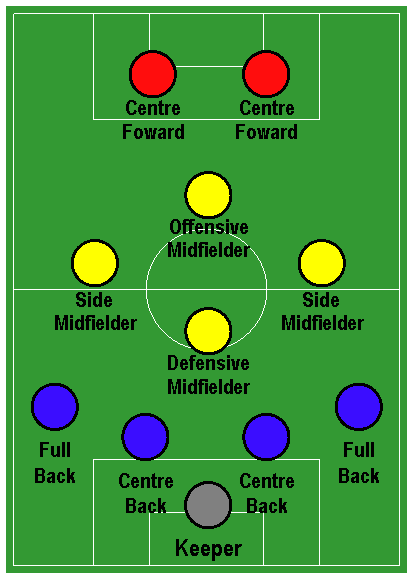Manager
.jpg)
Leonid Slutsky
Russia started its Euro campaign under the leadership of authoritative Fabio Capello (ex-coach of Juventus, Roma, and Real Madrid). However, he failed to lead the team to the play-offs at the 2014 World Cup and started off poorly in qualification for Euro 2016. Russian Football Union’s patience was running short and such unconvincing results led to Capello’s dismissal. Leonid Slutsky, arguably the best Russian coach, was called up to replace Don Fabio. It was he who led the Russian team to the winning of the four remaining games. Russian fans agree that they might not have star players, but rather they have a star coach.
Leonid Slutsky was born in Volgograd, Russia, and played as a goalkeeper for FC Zvezda. However, after playing 13 games, he broke his leg after his neighbor asked him to get her cat from a tree. He could not play professional football anymore. Nevertheless, he is one of the greatest examples of how an unsuccessful player can become a successful coach. He started his coaching career in his hometown of Volgograd in a semi-professional team “Olimpia”. After promoting his club to the second division, he was invited to coach a reserve team of FC Uralan, where he eventually became a coach for the first team. Later, Slutsky was invited as a reserve team coach: FC Moscow, a Russian Premier League (RPL) side, offered him his first professional contract. Once again, he replaced the head coach and his side beat Spartak Moscow in his first game. Two years later, he led FC Moscow to the 4th place and the final of Cup of Russia. Unfortunately, his ambitions were too high for the administrative team of FC Moscow as he asked for stronger players to help the team qualify for the UEFA Champions League (UCL) or become a champion (only the first two teams in the RPL qualify for the UCL). Management’s plans were very different: they decided to terminate his contract and sell team’s star players for a short-run profit. His talent was in-demand in the RPL, and he accepted an offer from Krylya Sovetov. His success with Krylya (6th place in the league) has not gone unnoticed by the “Big Four”: Zenith, CSKA, Lokomotiv and Spartak. As a result, he put a signature under CSKA’s contract in 2009 and has coached it since then.
Slutsky has already won 5 games as a Russian manager and has only lost once: in a friendly match against the favorite of the upcoming Euro, France (4:2). Slutsky became friends with the players (Mosko, 1); this approach was totally different from Fabio Capello’s army of trained soldiers. Also, Capello and his assistants did not speak Russian and did not want to learn it. Slutsky, however, is Russian and, most importantly, knows half of the team from CSKA as the Armeitsy1 have always been the major supplier for the national team.
Style of Play
Artem Dzyuba is a striker for Zenit St. Petersburg, and will most likely start for Russia at the Euro. Slutsky knows Igor Akinfeev, Vasiliy Berezutsky, Sergey Ignashevich, and Alan Dzagoev well from CSKA: they will start as a goalie, two central defenders, and a central midfielder, respectively. General concept will remain the same as in the previous games under the leadership of Slutsky: Dzyuba is a perfect example of a poacher and the whole team will supply him with crosses and short passes.

4-4-2 (diamond)
Slutsky is known as a flexible coach for the diversity of tactics he uses in his teams. He decided to not risk, however, and finished the qualification cycle with one tactics (4-3-1-2 diamond) as he replaced Capello mid-season. Nevertheless, we can expect Russia to surprise us at the Euro. First of all, Fedor Smolov’s form impresses everyone, including Slutsky. This can result in different variations of three-forward tactics, such as 4-3-3 or 4-2-3-1, with Smolov and Kokorin as wingers and Dzyuba in the middle. Secondly, three-forward formations allow teams to defend with 4-5-1 using wingers as side midfielders.
.jpg)
4-3-3
Strengths
Prior to Slutsky’s arrival, Guus Hiddink, Dick Advocaat and Fabio Capello were head coaches of Russia. Thus, it is not surprising that Russia is a very strong defensive side. According to Table 1, they concede less than 3 goals in 2 games. Recall that Akinfeev, Berezutsky and Ignashevich started playing for the national team and CSKA in the early 2000s. Their long-lasting chemistry allowed Russia have 24 clean sheets in the last 48 games.
| 2012-2016 Statistics | |||
| Games Played | Goals Conceded | Clean Sheets | Goals per Match |
| 48 | 29 | 24 | 0.604 |
source: own calculations based on Sports.ru statistics
Weaknesses
They have netted a lot of goals against football “dwarfs”: 7 goals on Liechtenstein, 4 goals on Luxemburg, Azerbaijan and Belarus. Unlike their defense however, only once has Russia scored 3 or more goals against a strong opponent (a win over Italy, 3:0). Nevertheless, Dzyuba, Smolov and Kokorin will be called to solve the attacking potential problem. Smolov has successfully represented his side, FC Krasnodar, in the Europa League this year, and Dzyuba proved himself as a great finisher in the UCL. Kokorin, in turn, is the most experienced striker having scored 11 goals in 37 games, which is an amazing result for a second striker2.
Dictionary:
1) Armeitsy (from Russian, soldiers) – CSKA’s nickname.
2) Second striker – a type of striker that has to participate in each phase of the game: defending, passing, shooting, and, most importantly, creating opportunities for the first striker.
How to cite this page: “Russia: Strategy and Tactics”, Written by Alikhan Mukhamedi(2016). European Cup 2016 Guide, Soccer Politics Blog, Duke University, http://sites.duke.edu/wcwp/tournament-guides/european-cup-2016-guide/underrated-teams-of-euro-2016/russia/russia-strategy-and-tactics/ (accessed on (date)).
